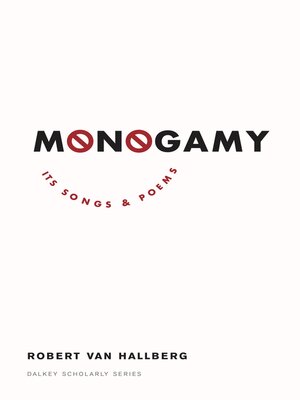
Sign up to save your library
With an OverDrive account, you can save your favorite libraries for at-a-glance information about availability. Find out more about OverDrive accounts.
Find this title in Libby, the library reading app by OverDrive.



Search for a digital library with this title
Title found at these libraries:
| Library Name | Distance |
|---|---|
| Loading... |
Monogamy elaborates an ideology of romance from extraordinary poems and songs, one by one. Poems and popular songs are still the main medium for preserving the rules of romance. Each chapter is a meditation on one of eight commonplaces about love: that it makes one monogamous, sentimental, vulnerable; that its force is immediate and transformative; or that it is a fickle force, but cannot be bought, and yet endures. Strong poets and lyricists bend these notions, as lovers do too. Great poems and songs come from interstices between celebrated commonplaces, felt desires and second-thoughts. The Book of Love is heterogeneous, complicated. Some love poems reach significant numbers through books and anthologies, and eventually classroom textbooks, and are held in memory by generations of admirers. Many popular songs, however, have reached extremely large audiences, beginning with Broadway musicals, and continuing in the recordings of later jazz vocalists. They are not read, but they are firmly lodged in memory. They are the only poems known by most audiences. Canonical poems are imitated by aspiring poets and versifiers. The actual verse culture is layered with light verse, song lyrics, and Shakespeare's sonnets. To understand what poems effectively teach—about romance, in particular—one should attend closely to songs too, particularly in the U.S. since 1920.







